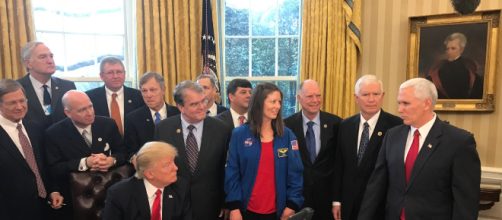Six allies are upset with President Donald Trump after he increased taxes on steel and aluminum. The Group of Seven countries that were affected are Canada, France, Germany, Italy, Japan and the United Kingdom. The affected countries are considered to be the world’s largest economies and the president’s action could possibly lead to a global trade war.
G-7 expresses their disagreements
According to CNN, the announcement took place in Whistler, Canada on Saturday, June 2, at a press conference for the G7 summit. US Treasury Secretary, Steven Mnuchin, was at the meeting as a representative for the United States as he listened to the finance ministers complain from each country that was in attendance.
Mnuchin stated that he would sit down and discuss everyone’s frustrations to the president when he returns to Washington.
The G7 Summit was supposed to be a gathering to discuss the goals and achievements of the global economy but it ended up being a heated debate instead. All of the finance ministers from each country that were present stated that imposing tariffs on the allies could cause division among them and affect overall economic growth.
Canada, the European Union, and Mexico have stated that they plan to retaliate against the United States after Trump imposed tariffs on them. Trump signed an agreement that went into effect on Friday and it stated that there will be a 25 percent import tariff on steel and 10 percent tariff on aluminum.
On Twitter, Trump tweeted, "The United States must, at long last, be treated fairly on Trade. If we charge a country ZERO to sell their goods, and they charge us 25, 50 or even 100 percent to sell ours, it is UNFAIR and can no longer be tolerated. That is not Free or Fair Trade, it is Stupid Trade!"
The United States must, at long last, be treated fairly on Trade. If we charge a country ZERO to sell their goods, and they charge us 25, 50 or even 100 percent to sell ours, it is UNFAIR and can no longer be tolerated. That is not Free or Fair Trade, it is Stupid Trade!
— Donald J. Trump (@realDonaldTrump) June 2, 2018
China responded back by adding taxes on cars, soybeans, and planes.
How will the higher tariffs affect us?
Bloomberg stated that the most affected industries will be construction and automobiles. Energy, machinery, and equipment will have little effect. Other sources mentioned that the president’s decision could hurt consumers by causing more products to be expensive. A few companies such as Goldman Sachs may lose some revenue and there may be an increase in unemployment in the construction, steel, and aluminum industry.
Former president George W. Bush implemented higher tariffs on steel and aluminum back in 2002 and about 200,000 employees lost their jobs, Politico reported.


